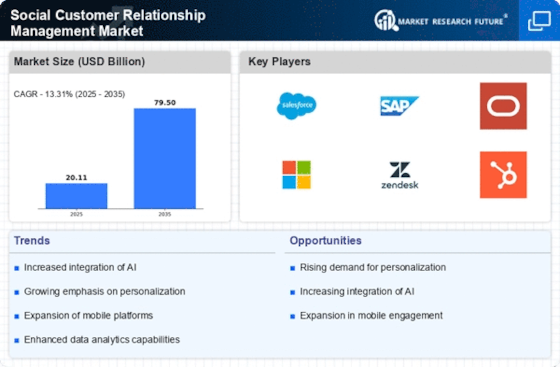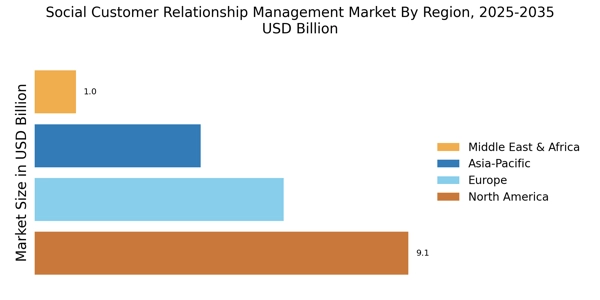Increased Adoption of Social Media Platforms
The Social Customer Relationship Management Market is significantly influenced by the widespread adoption of social media platforms. As of October 2025, billions of users engage with various social networks, creating a fertile ground for businesses to connect with their customers. This trend has led to a surge in the use of social CRM tools that integrate seamlessly with these platforms, allowing companies to monitor customer interactions and feedback in real-time. Data indicates that over 70% of consumers prefer to engage with brands through social media, highlighting the necessity for businesses to adapt their strategies accordingly. Consequently, the integration of social media into CRM systems is becoming a critical component for success, driving innovation and investment in the Social Customer Relationship Management Market.
Regulatory Compliance and Data Security Concerns
The Social Customer Relationship Management Market is increasingly shaped by regulatory compliance and data security concerns. As data privacy regulations become more stringent, businesses are compelled to adopt CRM solutions that ensure compliance while safeguarding customer information. The rise in data breaches has heightened consumer awareness regarding data security, prompting organizations to prioritize secure social CRM systems. According to industry reports, companies that demonstrate a commitment to data protection can enhance customer trust and loyalty. This focus on compliance and security is likely to drive investment in advanced social CRM technologies that not only meet regulatory requirements but also provide robust security features. Thus, the need for regulatory compliance and data security is a significant driver in the Social Customer Relationship Management Market.
Emergence of Advanced Analytics and AI Technologies
The Social Customer Relationship Management Market is experiencing a transformative phase due to the emergence of advanced analytics and artificial intelligence technologies. These innovations enable businesses to analyze vast amounts of customer data, uncovering patterns and trends that inform strategic decision-making. For instance, predictive analytics can forecast customer behavior, allowing companies to proactively address needs and preferences. As organizations increasingly leverage AI-driven insights, the demand for sophisticated social CRM solutions is expected to rise. Reports suggest that companies utilizing AI in their CRM strategies can enhance customer retention rates by up to 30%. This technological evolution is likely to redefine customer engagement practices, making it a pivotal driver in the Social Customer Relationship Management Market.
Growing Demand for Personalized Customer Experiences
The Social Customer Relationship Management Market is witnessing a pronounced shift towards personalized customer experiences. Businesses increasingly recognize that tailored interactions can significantly enhance customer satisfaction and loyalty. According to recent data, companies that prioritize personalization can achieve up to 20% higher sales. This trend is driven by the proliferation of data analytics tools that enable organizations to gather insights about customer preferences and behaviors. As a result, firms are investing in social CRM solutions that facilitate real-time engagement and customized communication. The ability to deliver relevant content and offers not only fosters stronger relationships but also positions companies competitively in a crowded marketplace. Thus, the demand for personalized experiences is likely to propel growth within the Social Customer Relationship Management Market.
Focus on Customer Engagement and Retention Strategies
The Social Customer Relationship Management Market is being propelled by a heightened focus on customer engagement and retention strategies. Businesses are increasingly aware that acquiring new customers is often more costly than retaining existing ones. As a result, organizations are investing in social CRM systems that facilitate ongoing communication and relationship-building with their customer base. Data shows that companies with strong customer engagement strategies can see a 50% increase in customer loyalty. This trend underscores the importance of maintaining a continuous dialogue with customers through social channels, which not only enhances satisfaction but also drives repeat business. Therefore, the emphasis on engagement and retention is likely to be a key driver in the Social Customer Relationship Management Market.

















